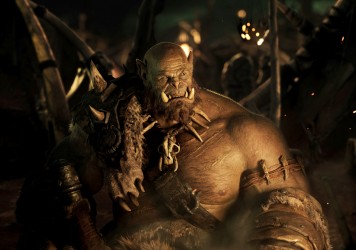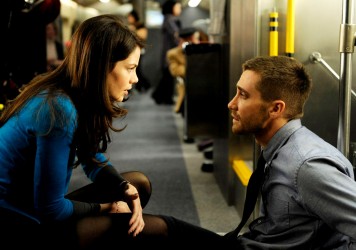Despite the silly names and cheesy nerdism there’s plenty of fun to be had in Duncan Jones’ video game adaptation.
Let’s go back to the beginning. In 1994, Blizzard Entertainment released its real-time strategy game Warcraft: Orcs and Humans, in which orcs from the world of Draenor used a magical trans-dimensional portal to invade the human world of Azeroth. Its success led to two sequels – but it was not until a full decade later, with the emergence in 2004 of ‘massively multiplayer online role-playing game’ World of Warcraft, that the game would become a global phenomenon. Two years later, Blizzard partnered up with Legendary Pictures to work on the inevitable film version. Notorious video games adapter Uwe Boll put himself forward as director, but was swiftly rejected.
Blizzard wanted to go back to the world(s) of Warcraft: Orcs and Humans, building a potential movie franchise from the origin story for what has become an expansive gaming multiverse – but production was delayed over concerns that viewers might find this saga of not just humans and orcs, but also dwarves, elves and wizards, too close to the mythos of Peter Jackson’s then recent Lord of the Rings trilogy. Eventually Duncan Jones – best known as the director of cerebral SF flicks Moon and Source Code, but also himself an avid longterm player of the game – was brought on board, and the result is a sprawling, effects heavy fantasy epic.
As power-hungry orc warlock Gul’dan (Daniel Wu) leads an advance party through a Dark Portal from the depleted lands of Draenor to fertile Azeroth, clan chieftain and new father Durotan (Toby Kebbell) begins to wonder whether Gul’dan and his destructive ‘Fel’ magic might in fact be the cause of all the Orcs’ woes, rather than their salvation. Meanwhile on the human side, Commander Anduin Lothar (Travis Fimmel), brother-in-law to the unifying King Llane Wrynn (Dominic Cooper), sees a threat to Azeroth’s very existence, and joins forces with young renegade magician Khadgar (Ben Schnetzer) and tough-loving orc-human halfbreed Garona (Paula Patton), even as Medivh (Ben Foster), the magic-wielding high protector of Azeroth, seems off his Guardian game.
Much as Llane rules a kingdom of tolerance and equality (and is himself in a mixed-race marriage with Ruth Negga’s Lady Taria), the screenplay from Jones and co-writer Charles Leavitt (Blood Diamond) affords a balanced view of both sides in the conflict, each with their own heroes, rebels, traitors and megalomaniacs. The basic story (colourfully immersive fantasy idyll invaded for its resources) is essentially Avatar without the SF – a debt that is acknowledged with Lothar’s aerial swoopings on a winged gryphon, and with the blue tones that characterise Azeroth magic. There are also obvious debts to Lord of the Rings, although this time around, instead of Gollum we get a golem. Last but not least, the monstrous medievalism of Army of Darkness (whose director, Sam Raimi, was for a time attached to helm Warcraft: The Beginning) is evoked by an early reference to a ‘boomstick’, and by a deep seam of fun running through all the surface earnestness.
It is all too easy to mock a film like Warcraft: The Beginning for its silly names, its arcane background lore and its cheesy nerdism (as though Star Wars or superhero flicks are so different). Yet while Jones’ film is certainly not for everyone (what film is?), it should also be remembered that, besides the legions of tween escapists, fantasy freaks, Tolkien zealots and Dungeons & Dragons devotees for whom this material may prove a perfect fit, there are also over 100 million registered users on World of Warcraft. So the film seems likely to recruit a substantial army of viewers in sympathy with what it has to offer – and they will be amply rewarded with the grand spectacle of the film’s design work, the immensity of its world building, and the relentless mobility of its storytelling (where characters always seem to be in motion, whether carried by horse, wolf, gryphon or teleportation spell). And if the ensemble roles here feel rather stock, at least they are humanised – or orcised – with the occasional funny, idiosyncratic line.
Best of all, the mo-capped, computer-generated orcs come with a real sense of bulk to match their bravado. The first time they are seen fighting, in Elwynn Forest, they are genuinely terrifying – and while Warcraft: The Beginning is far from a horror film, nonetheless it shows countless extras and even the odd principal getting hammered, sliced and crushed to their doom in brutal combat sequences. This is also, as the film’s title suggests, only the start of things, ending with one key battle, rather than the war, being won (and lost), and with a lot of gestures towards the next generation and a complicated future (more miscegeny and mayhem!) in store.
Published 26 May 2016
The trailer’s truly uninspiring, but the director’s a doozy.
Often trite, never boring, and the flashes of humour are welcome.
Not for us, but there is an audience out there for this ambitious fantasy world-building.

By David Moya
The video game makes it impossible for players to overcome racial framing. Will Duncan Jones’ adaptation follow suit?

Duncan Jones has hit the ground running, but there’s no need for Nolan to watch his back just yet.

The gap between movies and video games is closing. But what will happen when the viewer has control over the script?